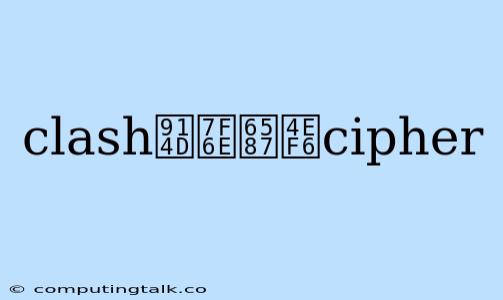Understanding and Using Cipher in Clash Configuration Files
Clash, a powerful open-source proxy tool, offers advanced configuration options, one of which is the cipher parameter within its configuration files. This parameter plays a crucial role in securing your internet traffic by enabling you to specify the encryption algorithms used for your connections.
What is Cipher in Clash Configuration?
The cipher parameter in Clash configuration files determines the encryption methods used when establishing connections through the proxy. In simple terms, it defines the "secret code" used to scramble and unscramble your internet data, ensuring its privacy and security.
Why is Cipher Important?
Cipher is essential for maintaining the integrity and security of your online activities. It ensures that your internet data is:
- Confidential: Prevents unauthorized access to your sensitive information like login credentials, financial data, and personal messages.
- Integrity: Protects your data from being tampered with or altered during transmission.
- Authenticity: Verifies the identity of the server you are communicating with, preventing man-in-the-middle attacks.
How to Use Cipher in Clash Configuration
The cipher parameter is typically specified within the "proxies" section of your Clash configuration file. Here's a general format:
proxies:
- name: "Your Proxy Name"
type: "ss"
server: "your.proxy.server.com"
port: 443
cipher: "aes-256-cfb"
password: "your_strong_password"
In this example, the cipher is set to "aes-256-cfb," which uses the Advanced Encryption Standard (AES) algorithm with a 256-bit key in Cipher Feedback (CFB) mode.
Available Cipher Options
Clash supports various cipher options, depending on the specific proxy type and underlying protocols. Some common ciphers include:
- AES-128-CFB: Uses AES with a 128-bit key in CFB mode.
- AES-192-CFB: Uses AES with a 192-bit key in CFB mode.
- AES-256-CFB: Uses AES with a 256-bit key in CFB mode.
- AES-128-GCM: Uses AES with a 128-bit key in Galois/Counter Mode (GCM).
- ChaCha20-Poly1305: Uses the ChaCha20 stream cipher with Poly1305 authentication.
Choosing the Right Cipher
The optimal cipher for your use case depends on several factors:
- Security Requirements: Higher bit keys generally offer stronger security. AES-256-CFB is considered a strong choice.
- Performance Considerations: Some ciphers might impact connection speed. Experiment to find the best balance.
- Proxy Provider Support: Ensure the proxy server you are using supports the chosen cipher.
Security Best Practices
- Use Strong Passwords: A strong password is crucial for protecting your data.
- Keep Your Software Updated: Regularly update Clash and your operating system for the latest security patches.
- Avoid Public Wi-Fi: If possible, use a secure connection when connecting to public Wi-Fi networks.
- Use a VPN: Consider using a VPN in conjunction with Clash for an extra layer of security.
Conclusion
The cipher parameter in Clash configuration files is a critical tool for securing your internet traffic. By carefully selecting the appropriate cipher and following best practices, you can significantly enhance the privacy and integrity of your online activities.
